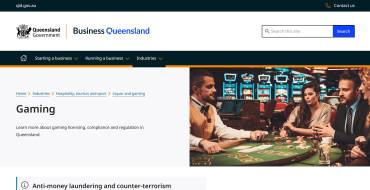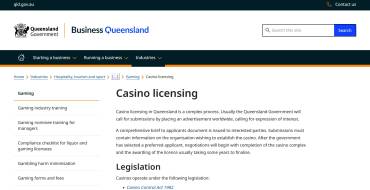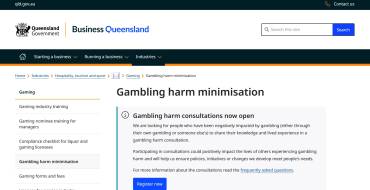
Queensland Office of Liquor and Gaming Regulation

The gambling industry in Australia is regulated quite specifically. Since the state is a federation and is divided into several states, each state has its own gambling commission. Accordingly, each regulator adopts laws at the state level. However, they must not contradict federal gambling laws.
In Queensland, the Queensland Office of Liquor and Gaming Regulation regulates the industry. This organization issues licenses for various types of gambling, collects taxes and performs a supervisory function.
The gambling industry in Australia is regulated quite specifically. Since the state is a federation and is divided into several states, each state has its own gambling commission. Accordingly, each regulator adopts laws at the state level. However, they must not contradict federal gambling laws.
In Queensland, the Queensland Office of Liquor and Gaming Regulation regulates the industry. This organization issues licenses for various types of gambling, collects taxes and performs a supervisory function.
Regulator licensed casinos
UBET QLD Limited is currently the sole holder of a betting license in Queensland.Queensland Office of Liquor and Gaming Regulation review
Queensland Office of Liquor and Gaming Regulation is responsible for regulating the gambling and alcohol industry in the state of Queensland, Australia.
There are three main objectives of the Authority:
- Regulating the alcohol and gambling industry, developing them in a way that minimizes potential harm;
- Maintaining the integrity of the gambling industry in Queensland and ensuring that the state and community benefit from gambling;
- Distributing funds through the Gambling Community Benefit Fund grant program.
Generally, the first two goals are pretty clear. Let's try to clarify the third purpose. The Gambling Community Benefit Fund awards grants to non-profit organizations to be used to expand services. Grant amounts range from $500 to $35,000. The amount is not that impressive, but it is worth considering that about $57 million dollars is distributed annually.
The Australian government bans interactive gambling such as online casinos, online slots and online "in-play" betting on sporting events.
The Interactive Gambling Act (2001) enforces these bans. The Australian Communications and Media Authority is responsible for overseeing compliance with this legislation. The Authority is the government body responsible for regulating the online industry in Australia. But Queensland has its own legislation relating to gambling. It does not violate federal law and is based on the following regulations:
- Casino Control Act 1984;
- The Betting and Racing Act 1998;
- The Lotteries Act 1997;
- The Interactive Gambling (Player Protection) Act 1998.
The regulator will allow charity lotteries to be run on the internet. The company running such lotteries must be fully compliant with the Charitable and Non-Profit Gaming Act 1999. Only then will it be able to apply for licensing. Online lotteries are also allowed, but Casinoz notes that this activity is monopolized by one company.
The situation with online skill-based games is quite interesting. The law does not ban them directly, but recommends getting legal advice. That is, it is quite possible to obtain a license, for example, for an online poker room. In addition, such a popular type of gambling as betting on sports and horse racing is allowed in the online format. But, again, only for one company.
The regulation of land-based gaming follows a standard format. There is a distinctive feature regarding slot machines, though. In Queensland, all slot machines located in specialized halls or hotels must be connected to an electronic monitoring system using the QCOM protocol. Currently over 43,000 slot machines located in Queensland, Northern Territory, Tasmania, Victoria and New Zealand also use this protocol.
Gallery
License types of Queensland Office of Liquor and Gaming Regulation
The Queensland Office of Liquor and Gaming Regulation issues several types of licenses.
Licenses for gaming employees:
- Gaming nominee - a license for an employee who has managerial rights and is responsible for conducting games at a particular gambling site.
- Gaming repairer - the license is issued to individuals. It authorizes the repair and installation of gaming machines in gambling halls and hotels.
- Key monitoring employee - an employee of a licensed gambling services company who holds a supervisory position. Also, this license is required if this employee can influence financial transactions.
- Wagering key person - an employee of a licensed bookmaker who holds a supervisory position or managerial role in relation to any operations conducted under the relevant betting authority.
- Lottery key person - issued to an employee who holds a position with a management function.
- Keno employee - a Keno employee license that companies or individuals must have in order to be able to conduct this type of business. Employees who work for this organization and do not hold management positions are not required to have this license.
Licensing by type of gambling:
- Lottery - a license to operate lotteries within Queensland.
- Wagering licenses - a license for betting on sports.
- Interactive gambling licensing - a license for sportsbooks that will operate on the internet.
- Keno - license for Keno lottery.
- Casino licensing - license for land-based casinos.
To apply for Interactive gambling licensing, a company must submit:
- application for an interactive gambling license;
- company information;
- materials related to the management system for the proposed interactive game;
- technical information to evaluate the regulated gaming equipment;
- payment of fees: $18,910 application fee, provided that the applicant company is not a person authorized to conduct charitable gaming.
Review of licensing applications takes place over several months. If a decision is made to grant a license, the company will have to pay $81,700 each quarter. This amount will increase annually. Additional licenses for key employees will also be required.
It is worth noting that the Keno license is held by Keno (QLD) Pty Ltd. It is the exclusive supplier of this type of game. Thus, no licenses are currently issued in this area. The situation is similar in lottery licensing. The only license holder at the moment is Golden Casket Lottery Corporation Limited (under the Tatts Group "Lott" brand name).
The application fee for a lottery operator's license is $18,910, with an additional quarterly license fee (as agreed with the government). The tax is also levied on gross gaming revenue. Currently, the tax rate for lottery-style games is 73.48% of gross revenue and 55% of gross revenue for instant lotteries.
The tax law is based on a "TWR threshold." If a company exceeds this value, it pays 15% of its income.
Sports betting is licensed in both online and offline spheres. But it's worth noting that UBET QLD Limited is the sole license holder for online betting. No new applications can be considered until June 30, 2044.
Sports betting licenses are not available until June 30, 2044.
Dispute resolution
The Queensland Office of Liquor and Gaming Regulation works hard to hold the industry to high standards. But there may be instances where a license holder or its employees violate industry rules or players' rights.
If there is a dispute, it is recommended that you contact the license holder before contacting the Office. In most cases, operators have developed procedures for resolving disputes. If the player is unable to resolve the conflict, it is possible to file a complaint with the Authority using a special online form or send an appeal by mail.
In the complaint it is necessary to provide detailed information, as well as attach possible evidence. The appeal will be considered within a month, but sometimes the process can be delayed.
Conclusion
The Queensland Office of Liquor and Gaming Regulation is pretty good at what it does. But given the experience of other regulators operating within Australia, the fact that there are some monopolies is not entirely clear. In particular, online betting is owned by one company, the same situation is observed in the lottery business. Of course, from the point of view of the state, it is convenient. But from the point of view of the world experience of licensing, monopoly is not a worthy example.
Casinoz also notes the practice of distributing gambling profits to a charity fund.
The Queensland Liquor and Gaming Authority provides a fairly transparent regulatory and licensing process.
Frequently asked Questions
The authority is responsible for regulating the gambling and alcohol industry in the state of Queensland, Australia. In addition, the organization issues gambling licenses.
All gambling licenses are issued.
The main objectives of the Authority are to regulate Queensland's alcohol and gambling industries, to monitor, maintain integrity and transparency, and to distribute company profits to charity.
The department issues licenses to employees of gambling organizations, as well as licenses for types of gambling activities: lotteries, Keno, betting on sports and horse racing (offline and online), traditional land-based casinos.
The department also issues licenses for the following types of gambling activities: lotteries, Keno, sports betting and horse racing (offline and online), traditional land-based casinos.
The Alcoholic Beverage and Gambling Regulation Authority operates at the Queensland state level, the Authority's powers do not extend to the whole of Australia.
The Office can be contacted online (via email addresses), by phone, or by mail. Complaints are accepted in the format of online applications or in the form of postal letters.
| Main info | ||||
| License types | Gaming nominee , Gaming repairer , Key monitoring employee , Wagering key person , Lottery key person , Keno employee , Lottery , Wagering licenses , Interactive gambling licensing , Keno , Casino licensing | |||
| Name | Queensland Office of Liquor and Gaming Regulation | |||
| Site languages | English | |||
| Website | https://www.business.qld.gov.au/ | |||
| Contacts | ||||
|
||||
|
||||
| Feedback form | Yes | |||
| 🏠 Post address | 63 George Street Brisbane Queensland 4000 |



















